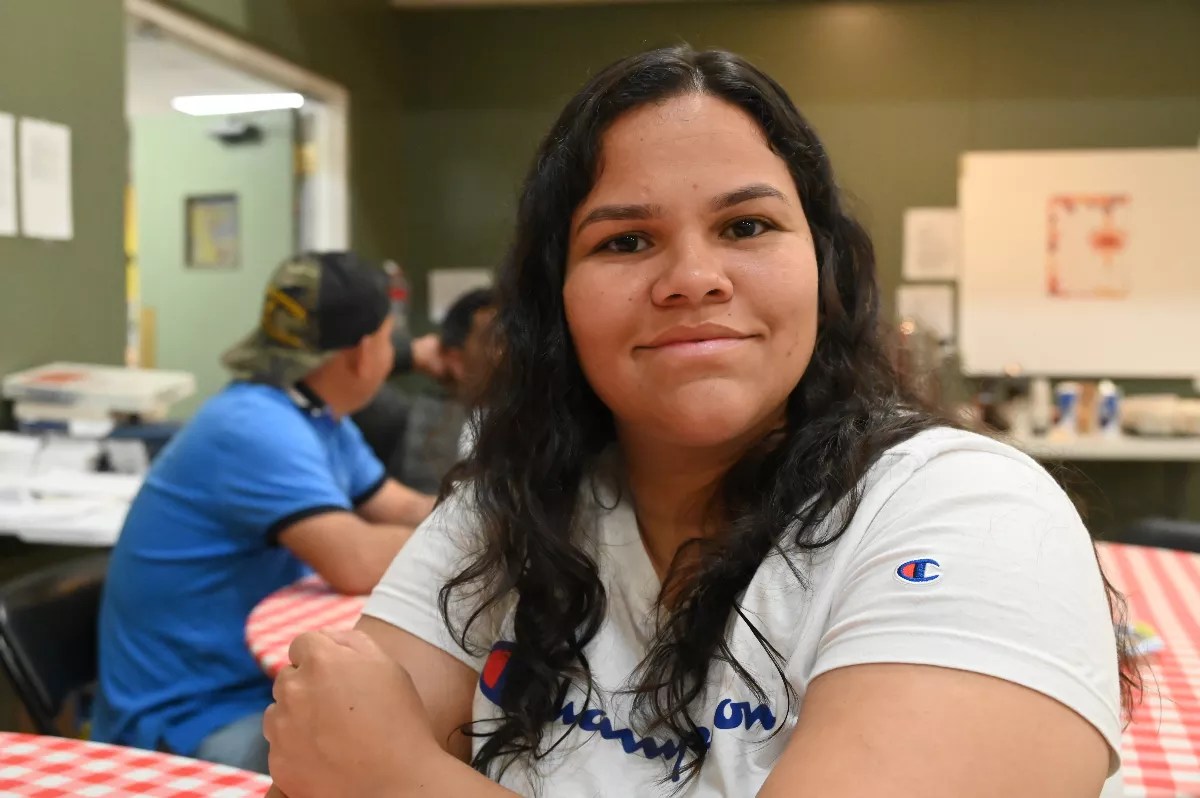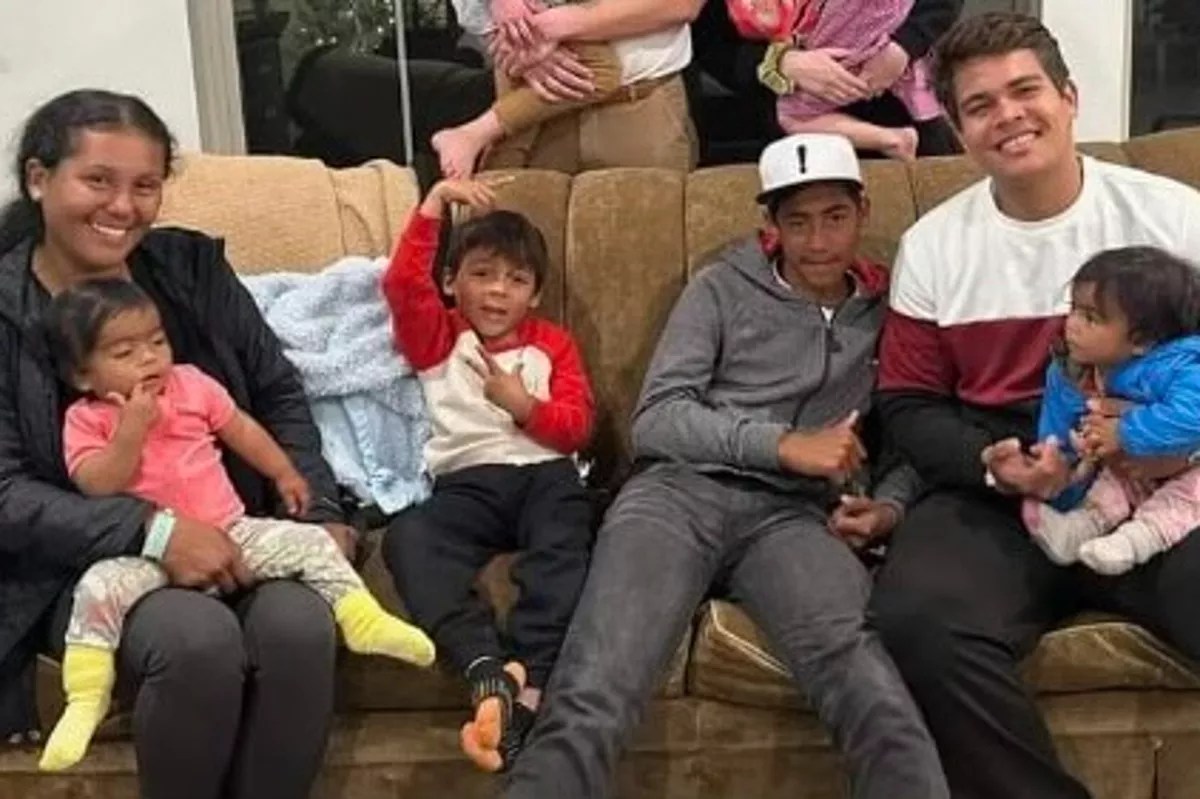
Bennito L. Kelty

Audio By Carbonatix
Drive east on Interstate 70 until Hays, Kansas, and then take exit 157 onto Highway 183. Continue down that road for about two hours, and turn left outside Greensburg. After driving ten minutes, you’ll be in the town of Haviland, Kansas, with a population of just under 700 people.
The Denver Friends Church had hoped that Haviland’s small population would soon grow by almost thirty people. The church at 4575 Eliot Street, which has been hosting a migrant shelter, had been working to send 29 immigrants, mostly from Venezuela, to Haviland before that shelter closes at the end of the week.
The only church to publicly shelter migrants (aside from the Denver Community Church, which is being used by the city as a transitional shelter for individual migrants), the Denver Friends Church has volunteers who cook for and take care of migrants, according to Senior Pastor Keith Reeser, but the church is getting burned out.
Since January 10, the Denver Friends Church has sheltered about 200 Venezuelan migrants, including fifteen to twenty migrant families.
“It takes ten to twelve volunteers a day to keep us operational – and, realistically speaking, that’s a lot for a small church like us,” Reeser says. “The major issue we’re running into is our people are burned out. Every night, needing to function at this capacity has really pushed people to their limit.”
The church has been relying on volunteers to stay up through the night at the shelter to keep watch and warn migrants in case of fires or other emergencies. “It creates an exhausted person,” Reeser says. “Most of them have to go to work the next day.”
With volunteers struggling to keep up and the church self-funding its shelter project, Reeser and other leaders finally decided to close the doors of the shelter on March 29, leaving the last couple dozen migrants there with nowhere to go except the streets.
So Reeser started looking for options.
The church is part of the Religious Society of Friends, whose members are colloquially known as Quakers; Friends churches exist across the country, including in Haviland. Reeser lived in Haviland for five years while attending Barclay College, a four-year institution founded by Quakers; he’s also the brother-in-law of Haviland’s mayor, Brad Lingafelter.
Founded by a group of Quakers in the early twentieth century, Haviland calls itself “the best little city in Kansas.” It was named after Laura Smith Haviland, a Quaker and abolitionist who was part of the underground railroad in the mid-1800s.
“They know my heart, and they know me personally, so it made those conversations faster,” Reeser says. “We could have much more speedy conversations and not feel like I’m trying to force somebody to do something I wouldn’t do myself.”
Through his Haviland connections, Reeser learned about a rancher there who needed ten people to work with cattle and crops. So he came up with the idea of sending some of the migrants currently sheltering at his church to Haviland, to fill those ranch positions.
Rent in Haviland costs between $300 and $400 for one- or two-bedroom units, and the migrants would be earning upwards of $2,000 a month, Reeser says. Even better, Reeser realized that if he sent migrants with children, they could give a boost to Haviland Grade School, an elementary school with an enrollment of fifty to sixty students. With more students, the school could increase enrollment and get more money from the State of Kansas, he suggests.
“When you compare that to Denver, you can get by on a much smaller salary and provide for your familiy,” Reeser says. “That’s why I was intrigued. It’s got sustainability, longevity, the school district would be blessed, they would be able to hire new teachers, they would be able to give them an education, there’s a local church.”
Hiland Dairy, a popular Midwestern brand, is planning on opening a facility in about six months just outside Haviland and will add about 200 jobs to the area; down the line, Reeser says, he hoped the new factory would hire migrants to fill some of those positions.
Originally, Reeser had made plans to move the migrants to Haviland during the first week of April – but then the plan unraveled.
Reeser’s Haviland connections recently told him the town doesn’t have enough housing for the migrants, and the rancher offering jobs asked for time to consult with a lawyer to make sure he wasn’t breaking laws. The rancher then went on vacation and has been unreachable.
Having lived in Haviland, Reeser suspects that the town’s population may have started pushing back against the idea.
“We’re hitting some roadblocks. Some of the housing situations and the work situations have changed,” he says. “I prefer the town not be blamed for this, but there are different mindsets in different parts of our country.”
As a former resident, Reeser says he knows “when you have a small town like that, it’s insulated, anything that happens is suddenly a hot topic and people can get charged up on it pretty fast. That’s what you have to contend with in a small town.”
Reeser is still expecting to move one or two families to Haviland, but not until May at the earliest, and they won’t be from his church’s shelter. The two migrant families met Reeser at the church’s Spanish services and were selected to go because they’re being discharged from a city-run shelter before the end of March. The father of one of the families is eligible for a work permit and only needs to go through the process of acquiring it, Reeser notes.
But Reeser is still worried about the migrants who will have to leave when the church’s shelter closes this week. “Some of the things people are reporting to me that has happened to them on the street, it keeps you up at night,” he says. “Their kids are not going to have a future, and their kids may not survive being on the street. People do horrible things when they’re desperate.”
Alizabeth Quero, a Venezuelan migrant staying at the Denver Friends Church with her husband, says they “don’t have anywhere else to go” when the shelter closes on Friday.
“We’re looking for a place to lease or rent a room, or something,” Quero says, adding that she and her husband will live out of their truck if they don’t find any other housing option.
“There I have my clothes, I have my blankets, and, well, we’ve already slept a few times in there. And if that’s what we have to do, so be it. We don’t have a work permit, so we can’t rent,” she explains.
Quero came to Denver six months ago and has already run out of time at Denver’s city-run shelters, which offer two weeks to individual migrants and 42 days for families with children. The couple has been staying at the Denver Friends Church for two weeks.

A migrant family that attended Spanish services at the Denver Friends Church will still get the chance to move to Haviland, Kansas, after the town backed out of taking a bigger group.
Courtesy of Keith Reeser
She heard about the Denver Friends Church from other migrants while washing car windows at an intersection. Spanish services at the church have attracted more than a hundred people who are mostly migrants, Reeser says.
About 40,000 migrants have arrived in Denver since December 2022 and at the beginning of the year, the city was facing a cost of nearly $180 million to shelter more and transport others elsewhere through 2024. Mayor Mike Johnston cut into that cost by closing four of the city’s ten migrant shelters to save $20 million for the year.
But the Denver Friends Church wasn’t one of those four. It’s operating on volunteer labor and without city funding.
“We’re spending millions as a city to keep certain people in shelters,” Reeser points out. “But what about the little guys operating out of their own pockets? We’re not getting any help.”
The Denver Friends Church started working towards opening as a shelter for migrants in November. After passing inspections to get the city’s permission to let people sleep in the church, it opened on January 10 as a small migrant shelter.
The church sheltered and fed hundreds of migrants without any city funding for almost three months. While Reeser appreciates the “kindness from the city” during the process, he would prefer “finances to back it up.”
Angelson Lozano, a Venezuelan migrant staying at the Denver Friends Shelter with his brother, will have to leave the shelter on Friday. “We don’t really have any options at the moment,” Lozano says. “Right now, all we can do is stay in a truck.”
Lozano has been in Denver for seven months, so he has exhausted his time at the city’s shelters. Like Quero and her husband, Lozano and his brother saved up money to buy a car to live in.
Even though he slept outside during his journey from Venezuela to the United States, Lozano says that “I don’t think anyone can get used it, even if you can handle it.”
His sister-in-law and nephew chose to travel onward from Denver to Miami, an option that the City of Denver will pay for as long as a migrant is in a shelter or receiving related services.
Reeser says that other churches in the metro area have opened as private shelters for a handful of migrant families or individuals, but insist on staying out of the spotlight. However, the Denver Friends Church wanted to be public about its shelter as a model for other churches.
“We wanted try and show that there’s a way to do this publicly,” he says. “We’re not saying we did it perfect.”
Reeser is now pitching the idea he had for Haviland to other towns. He has the information from dozens of migrants who came through the shelter, including their phone numbers, work status, immigration paperwork, job experiences, skill sets and preferences between city life or small town living.
With that information, Reeser has been making four or five phone calls a day to reach out to “friends all around the country,” including Kansas, Oregon and Idaho, to see if anyone needs potential labor or students to fill seats.
“If your church or one church were to adopt one family, what would that look like?” Reeser asks the people he calls. “It’s making sure we’re not sending people to a hopeless scenario that’s maybe similar or worse than here. I want to send them to something that has really good chances.”
Reeser looks on the bright side. “Although this may not work out,” he says, “at least I know what I’m looking for now. Let’s say another town pops up and they’re interested. Well, I’ve got a database and I’ve got families that want to go now.”
Sending one or two migrant families at a time and seeing how well that goes might be a more realistic plan, he admits. “If it’s successful with one or two and there’s a real sustainability, they might ask for more,” he says.
Still, Reeser needs help now for the migrants at his church’s shelter.
“Everybody is a real person that is desperate,” Reeser says. “It can’t all hinge on me. I’m just one person. I have very limited resources. I have very limited time, and I’m tired. But it’s worth it. The work is incredible. I believe in what I’m doing.”